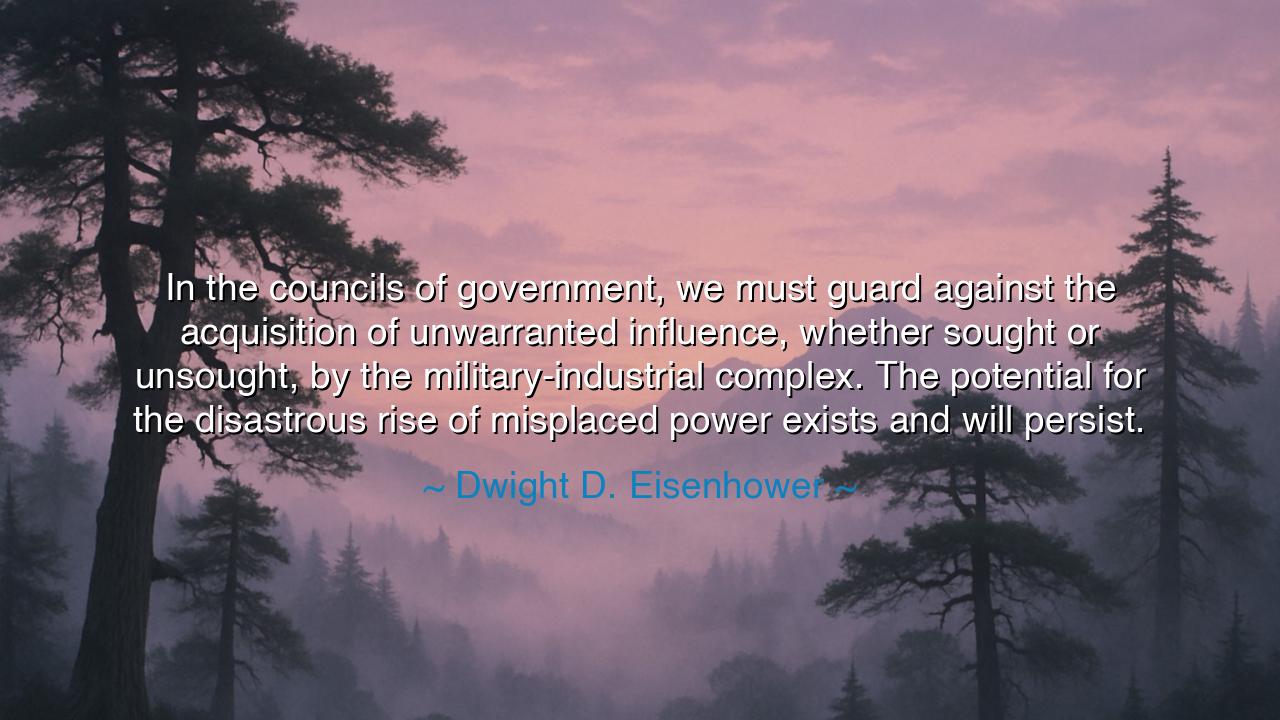
In the councils of government, we must guard against the
In the councils of government, we must guard against the acquisition of unwarranted influence, whether sought or unsought, by the military-industrial complex. The potential for the disastrous rise of misplaced power exists and will persist.






"In the councils of government, we must guard against the acquisition of unwarranted influence, whether sought or unsought, by the military-industrial complex. The potential for the disastrous rise of misplaced power exists and will persist." – Dwight D. Eisenhower
In these solemn words, Dwight D. Eisenhower, a soldier turned statesman, sounded a warning that echoes across generations. Spoken at the twilight of his presidency in 1961, his Farewell Address was not a speech of triumph but of vigilance. As a man who had commanded armies and seen the cost of war with his own eyes, he understood that power, once born of necessity, often seeks to perpetuate itself beyond its rightful bounds. Thus, he spoke of the military-industrial complex—the vast alliance of defense industries, government institutions, and armed forces that, if left unchecked, might bend the destiny of a free nation to its own interests.
To "guard against the acquisition of unwarranted influence" is to remember that even noble tools can become dangerous masters. The alliance of military and industry, once created to defend liberty, can—through greed, ambition, or fear—become a silent ruler of policy, shaping nations not through ballots or voices, but through contracts, weapons, and whispers in high chambers. Eisenhower’s warning was not an attack on defense but a defense of democracy itself. He, more than most, knew that the sword must always serve the hand of the people—not the other way around.
The origins of his concern lay in the aftermath of World War II. The United States had risen to global power, its industries transformed into engines of war. The Cold War deepened, and an arms race began—a ceaseless march of innovation, profit, and paranoia. Eisenhower, though once the supreme commander of Allied forces, saw that a new kind of battle was emerging: not between nations on the field, but between democracy and its own machinery of defense. He foresaw a world where corporations thrived on conflict, where wars became profitable, and where the fear of enemies, real or imagined, could be used to justify endless expansion.
History bore out his fears. The Vietnam War, fought years after his warning, became a grim monument to the power of the military-industrial complex. It was a conflict prolonged by politics and profit, where truth was often sacrificed to preserve contracts and prestige. Thousands died, not because peace was impossible, but because too many stood to gain from its delay. Eisenhower’s prophecy had come to life: misplaced power, clothed in patriotism, leading nations into ruin. The tragedy of Vietnam was not only in the loss of life—it was in the erosion of trust between the governed and those who claimed to govern in their name.
Yet his words were not meant to breed despair, but awareness. For Eisenhower believed in the wisdom of a free people. He believed that vigilance, not violence, was the guardian of liberty. His call was not for rebellion but for restraint—an appeal to conscience in an age of progress. He understood that when citizens become indifferent, power grows reckless. When the public ceases to ask questions, democracy decays in silence. His was a warning born of love for his country, not suspicion of it.
In the ancient world, philosophers like Plato and Cicero spoke of the same danger: that republics perish not by invasion from without, but by corruption from within. The lust for dominance—whether military or economic—has always tempted men to place expedience above principle. Eisenhower’s voice joined that long chorus of sages reminding us that freedom survives only where power is bounded by morality. The armies of democracy must always march under the banner of the people’s will, never the profit of a few.
The lesson for our time is this: be watchful stewards of liberty. Question not the need for strength, but the motives that guide it. Support the defense of your nation, but never forget that the greatest defense is truth itself. Participate in the governance of your country—vote, learn, speak, and hold your leaders to account. For the "disastrous rise of misplaced power" is not inevitable; it grows only in the shadows where citizens no longer look.
Let every generation remember Eisenhower’s parting counsel: that the sword of freedom must be kept sharp, but never unsheathed for gain; that wealth must serve humanity, not rule it; and that in the councils of power, the voice of conscience must forever speak louder than the clang of arms. Only then can a nation remain both strong and free—its might tempered by wisdom, its heart uncorrupted by ambition.






AAdministratorAdministrator
Welcome, honored guests. Please leave a comment, we will respond soon